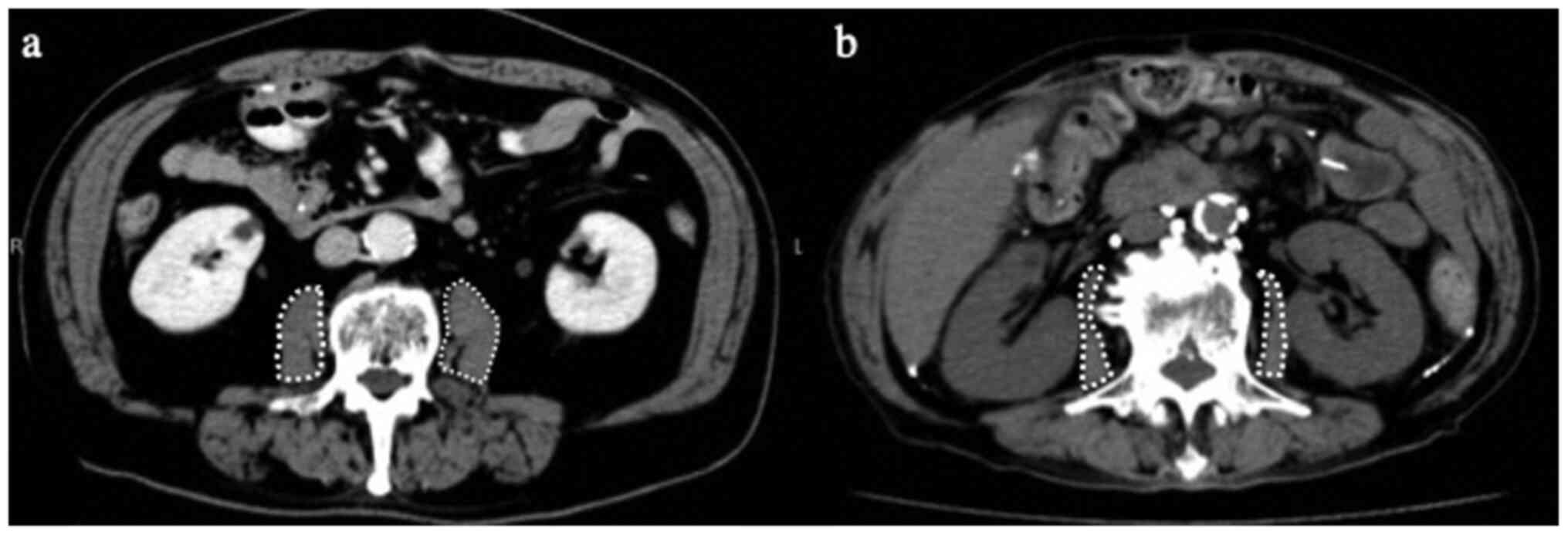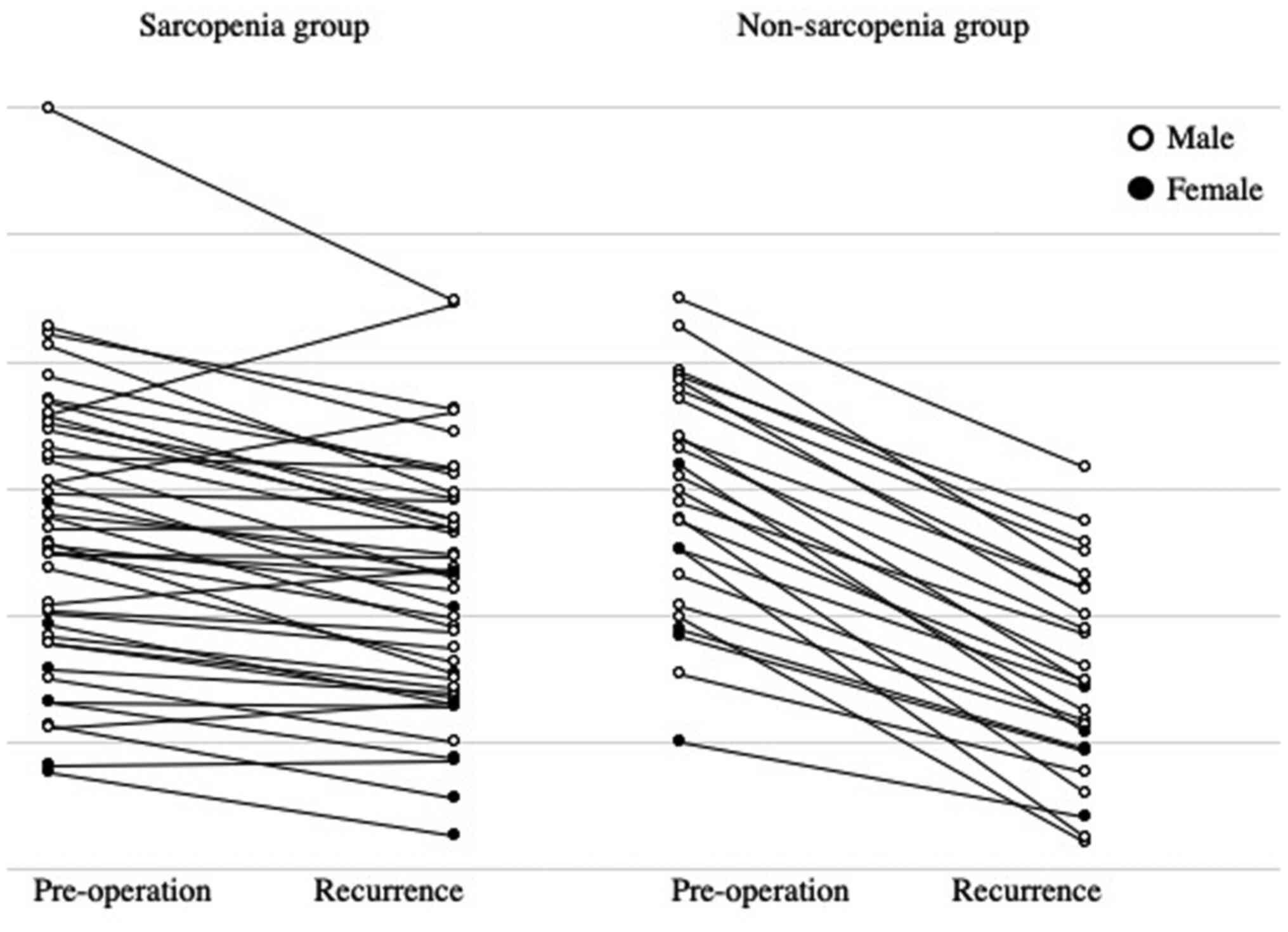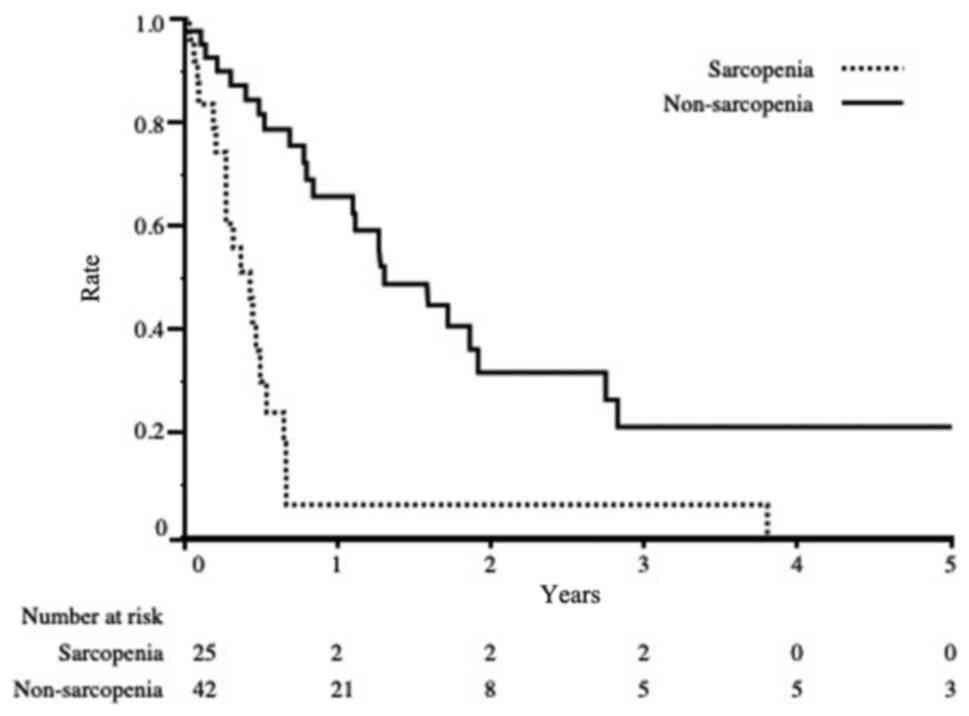|
1
|
Siegel RL, Miller KD and Jemal A: Cancer
statistics, 2020. CA Cancer J Clin. 70:7–30. 2020.PubMed/NCBI View Article : Google Scholar
|
|
2
|
Cruz-Jentoft AJ, Baeyens JP, Bauer JM,
Boirie Y, Cederholm T, Landi F, Martin FC, Michel JP, Rolland Y,
Schneider SM, et al: Sarcopenia: European consensus on definition
and diagnosis: Report of the European working group on sarcopenia
in older people. Age Ageing. 39:412–423. 2010.PubMed/NCBI View Article : Google Scholar
|
|
3
|
Nagata K, Tsujimoto H, Nagata H, Harada M,
Ito N, Kanematsu K, Nomura S, Horiguchi H, Hiraki S, Hase K, et al:
Impact of reduced skeletal muscle volume on clinical outcome after
esophagectomy for esophageal cancer: A retrospective study.
Medicine (Baltimore). 97(e11450)2018.PubMed/NCBI View Article : Google Scholar
|
|
4
|
Antoun S, Borget I and Lanoy E: Impact of
sarcopenia on the prognosis and treatment toxicities in patients
diagnosed with cancer. Curr Opin Support Palliat Care. 7:383–389.
2013.PubMed/NCBI View Article : Google Scholar
|
|
5
|
Fukuda Y, Yamamoto K, Hirao M, Nishikawa
K, Nagatsuma Y, Nakayama T, Tanikawa S, Maeda S, Uemura M, Miyake
M, et al: Sarcopenia is associated with severe postoperative
complications in elderly gastric cancer patients undergoing
gastrectomy. Gastric Cancer. 19:986–993. 2016.PubMed/NCBI View Article : Google Scholar
|
|
6
|
Huang DD, Chen XX, Chen XY, Wang SL, Shen
X, Chen XL, Yu Z and Zhuang CL: Sarcopenia predicts 1-year
mortality in elderly patients undergoing curative gastrectomy for
gastric cancer: A prospective study. J Cancer Res Clin Oncol.
142:2347–2356. 2016.PubMed/NCBI View Article : Google Scholar
|
|
7
|
Kawamura T, Makuuchi R, Tokunaga M,
Tanizawa Y, Bando E, Yasui H, Aoyama T, Inano T and Terashima M:
Long-term outcomes of gastric cancer patients with preoperative
sarcopenia. Ann Surg Oncol. 25:1625–1632. 2018.PubMed/NCBI View Article : Google Scholar
|
|
8
|
Ongaro E, Buoro V, Cinausero M,
Caccialanza R, Turri A, Fanotto V, Basile D, Vitale MG, Ermacora P,
Cardellino GG, et al: Sarcopenia in gastric cancer: When the loss
costs too much. Gastric Cancer. 20:563–572. 2017.PubMed/NCBI View Article : Google Scholar
|
|
9
|
Wang SL, Zhuang CL, Huang DD, Pang WY, Lou
N, Chen FF, Zhou CJ, Shen X and Yu Z: Sarcopenia adversely impacts
postoperative clinical outcomes following gastrectomy in patients
with gastric cancer: A prospective study. Ann Surg Oncol.
23:556–564. 2016.PubMed/NCBI View Article : Google Scholar
|
|
10
|
Zhuang CL, Huang DD, Pang WY, Zhou CJ,
Wang SL, Lou N, Ma LL, Yu Z and Shen X: Sarcopenia is an
independent predictor of severe postoperative complications and
long-term survival after radical gastrectomy for gastric cancer:
Analysis from a large-scale cohort. Medicine (Baltimore).
95(e3164)2016.PubMed/NCBI View Article : Google Scholar
|
|
11
|
Gosney MA: Clinical assessment of elderly
people with cancer. Lancet Oncol. 6:790–797. 2005.PubMed/NCBI View Article : Google Scholar
|
|
12
|
Japanese Gastric Cancer Association.
Japanese classification of gastric carcinoma: 3rd English edition.
Gastric Cancer. 14:101–112. 2011.PubMed/NCBI View Article : Google Scholar
|
|
13
|
Hamaguchi Y, Kaido T, Okumura S, Kobayashi
A, Hammad A, Tamai Y, Inagaki N and Uemoto S: Proposal for new
diagnostic criteria for low skeletal muscle mass based on computed
tomography imaging in Asian adults. Nutrition. 32:1200–1205.
2016.PubMed/NCBI View Article : Google Scholar
|
|
14
|
Mourtzakis M, Prado CM, Lieffers JR,
Reiman T, McCargar LJ and Baracos VE: A practical and precise
approach to quantification of body composition in cancer patients
using computed tomography images acquired during routine care. Appl
Physiol Nutr Metab. 33:997–1006. 2008.PubMed/NCBI View
Article : Google Scholar
|
|
15
|
Rosenberg IH: Sarcopenia: Origins and
clinical relevance. J Nutr. 127 (5 Suppl):990S–991S.
1997.PubMed/NCBI View Article : Google Scholar
|
|
16
|
Aoyama T, Kawabe T, Fujikawa H, Hayashi T,
Yamada T, Tsuchida K, Yukawa N, Oshima T, Rino Y, Masuda M, et al:
Loss of lean body mass as an independent risk factor for
continuation of S-1 adjuvant chemotherapy for gastric cancer. Ann
Surg Oncol. 22:2560–2566. 2015.PubMed/NCBI View Article : Google Scholar
|
|
17
|
Shen Y, Hao Q, Zhou J and Dong B: The
impact of frailty and sarcopenia on postoperative outcomes in older
patients undergoing gastrectomy surgery: A systematic review and
meta-analysis. BMC Geriatr. 17(188)2017.PubMed/NCBI View Article : Google Scholar
|
|
18
|
Sugiyama K, Narita Y, Mitani S, Honda K,
Masuishi T, Taniguchi H, Kadowaki S, Ura T, Ando M, Tajika M and
Muro K: Baseline sarcopenia and skeletal muscle loss during
chemotherapy affect survival outcomes in metastatic gastric cancer.
Anticancer Res. 38:5859–5866. 2018.PubMed/NCBI View Article : Google Scholar
|
|
19
|
Japanese Gastric Cancer Association.
Japanese gastric cancer treatment guidelines 2014 (ver. 4). Gastric
Cancer. 20:1–19. 2017.PubMed/NCBI View Article : Google Scholar
|
|
20
|
Yamamoto K, Nagatsuma Y, Fukuda Y, Hirao
M, Nishikawa K, Miyamoto A, Ikeda M, Nakamori S, Sekimoto M,
Fujitani K and Tsujinaka T: Effectiveness of a preoperative
exercise and nutritional support program for elderly sarcopenic
patients with gastric cancer. Gastric Cancer. 20:913–918.
2017.PubMed/NCBI View Article : Google Scholar
|
|
21
|
Kosuga T, Hiki N, Nunobe S, Noma H, Honda
M, Tanimura S, Sano T and Yamaguchi T: Feasibility and nutritional
impact of laparoscopy-assisted subtotal gastrectomy for early
gastric cancer in the upper stomach. Ann Surg Oncol. 21:2028–2035.
2014.PubMed/NCBI View Article : Google Scholar
|
|
22
|
Ishibashi Y, Tsujimoto H, Hiraki S, Kumano
I, Yaguchi Y, Horiguchi H, Nomura S, Ito N, Shinto E, Aosasa S, et
al: Prognostic value of preoperative systemic immunoinflammatory
measures in patients with esophageal cancer. Ann Surg Oncol.
25:3288–3299. 2018.PubMed/NCBI View Article : Google Scholar
|
|
23
|
Forrest LM, McMillan DC, McArdle CS,
Angerson WJ and Dunlop DJ: Evaluation of cumulative prognostic
scores based on the systemic inflammatory response in patients with
inoperable non-small-cell lung cancer. Br J Cancer. 89:1028–1030.
2003.PubMed/NCBI View Article : Google Scholar
|
|
24
|
Ishibashi Y, Tsujimoto H, Yaguchi Y, Kishi
Y and Ueno H: Prognostic significance of systemic inflammatory
markers in esophageal cancer: Systematic review and meta-analysis.
Ann Gastroenterol Surg. 4:56–63. 2019.PubMed/NCBI View Article : Google Scholar
|
|
25
|
Ignacio de Ulíbarri J, González-Madroño A,
de Villar NG, González P, González B, Mancha A, Rodríguez F and
Fernández G: CONUT: A tool for controlling nutritional status.
First validation in a hospital population. Nutr Hosp. 20:38–45.
2005.PubMed/NCBI
|
|
26
|
Toyokawa T, Kubo N, Tamura T, Sakurai K,
Amano R, Tanaka H, Muguruma K, Yashiro M, Hirakawa K and Ohira M:
The pretreatment controlling nutritional status (CONUT) score is an
independent prognostic factor in patients with resectable thoracic
esophageal squamous cell carcinoma: Results from a retrospective
study. BMC Cancer. 16(722)2016.PubMed/NCBI View Article : Google Scholar
|

















